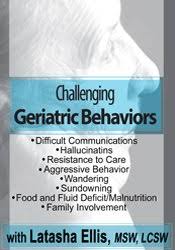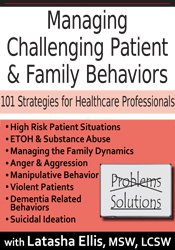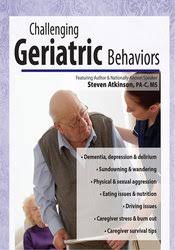🎁 Exclusive Discount Just for You!
Today only: Get 30% OFF this course. Use code MYDEAL30 at checkout. Don’t miss out!
Caregivers find it challenging to deal with many of the older adult behaviors. The most common contributing factors are dementia and delirium.
Latasha Ellis – Challenging Geriatric Behaviors

Description:
- Difficult Communications
- Hallucinations
- Resistence to Care
- Aggressive behavior
- Wandering
- Sundowning
- Malnutrition/Food and Fluid Deficit/Malnutrition
- Family involvement
Caregivers find it challenging to deal with many of the older adult behaviors. Most common contributing factors to dementia and delirium are dementia. Understanding what to expect from and what to do about specific behaviors can reduce frustration and increase satisfaction. The framework can be used to help you choose management strategies.
Theory and evidence are used to assess and manage people. This program focuses on day to day management through interactive discussions, videos and clinical examples.-To-day strategies to manage and prevent difficult geriatric behaviors.
OUTLINE
The Baseline
- Objective Measurements
- Escalation Risk Factors Challenging Behaviors
- Influence of cultural and societal factors, gender, and socioeconomic factors
- Interactional and environmental considerations
- Lifelong patterns and preferences
How to distinguish between depression, dementia and delirium
- Diagnostic Criteria
- Signs/Symptoms
- Management
Alzheimer’s Disease: Assessment and Management
- Different Types of Dementia
- Retrogenesis: Stages and Progression
- Optional Pharmacological Treatments
- Problems Commonly Associated with Alzheimer’s Disease: Difficult Communication, Hallucinations, Resistance/Aggression, Wandering, Sundowning, Malnutrition
- Interventions to Provide a Positive Experience
Difficult Communications and Hallucinations
- Contributing Factors
- Verbal and nonverbal-verbal Techniques
- Therapeutic use of Self
- Reorientation, Reminiscence
Validation
- Problem Solving
- You can be their reality
Resistence to Care
- Routine Hygiene
- Resistant Reasons
- Successful Techniques
Physically Aggressive Behaviors
- Reverse Developmental Behaviour
- Behaviors Communication as a Method
- Identify the problem/trigger
- Environmental and interactional factors
- Causes of Escalation
Wandering and sundowning
- Factors that Contribute
- Assessment
- Activity and exercise
- Environmental Management
- Interactional Management
Malnutrition/Food and Fluid Deficit/Malnutrition
- These are the Reasons They Might Not Eat
- There are many ways to increase nutritional intake
- Tips for people who need feeding assistance
- The Eating Environment
- End of Life
The Family Caregiver, as a member of the Team
- Family Dynamics and Change
- Emotions exhibited during caregiving: Both positive and negative
- Positive communication among staff, family, and older adults
- Assist the caregiver in meeting the needs of the care recipient
- These are some helpful resources
- There are ways to reduce stress for caregivers
Would you like to be contacted? Latasha Ellis – Challenging Geriatric Behaviors ?
OBJECTIVES
- Assess older adults to determine baseline behavior.
- Discuss the causes of challenging geriatric behavior and how to prevent them.
- You can distinguish between dementia, delirium and depression in the elderly.
- Explain the progression of Alzheimer’s disease and related treatment options.
- Select appropriate environmental, interactional, behavioral, and/or physical/pharmacological interventions to prevent and/or manage challenging geriatric behaviors.
- Differentiate between effective and ineffective strategies to manage difficult communications, hallucinations, resistance and aggressive behavior, wandering, sundowning, and food and fluid deficit/malnutrition.
- Find resources that offer information and services to caregivers.
Course Features
- Lectures 0
- Quizzes 0
- Duration Lifetime access
- Skill level All levels
- Language English
- Students 0
- Assessments Yes


